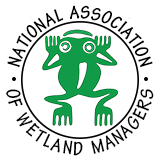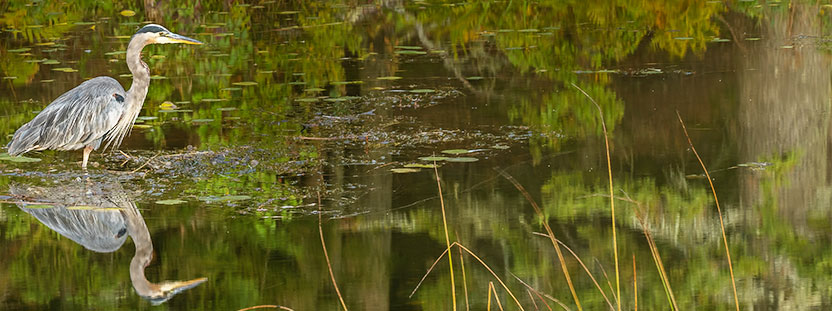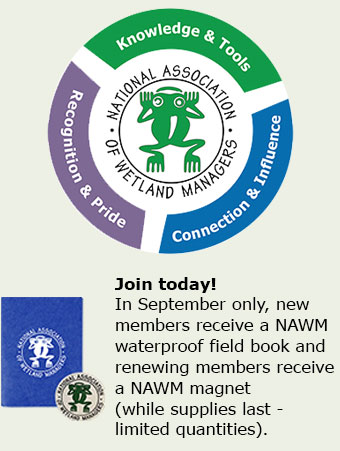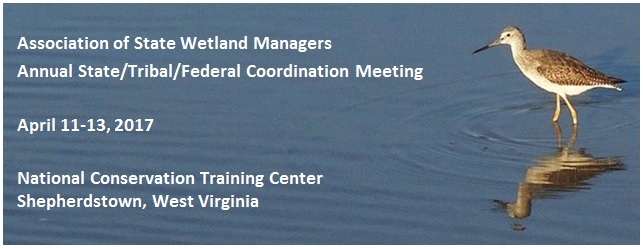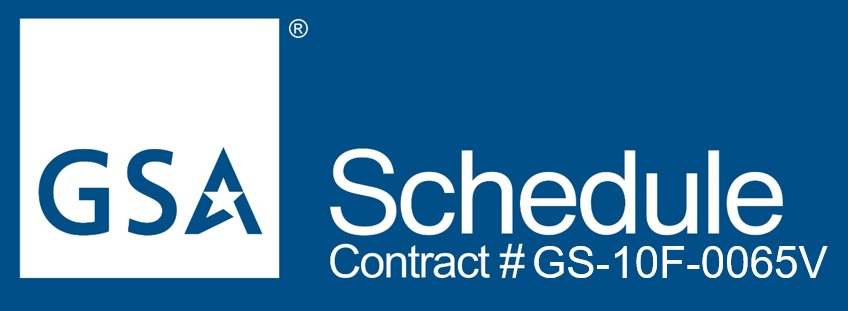Help Support Our Nation's Wetlands
NAWM
The National Association of Wetland Managers is a nonprofit membership organization established in 1983 to promote and enhance protection and management of wetland resources, to promote application of sound science to wetland management efforts and to provide training and education for our members and the public. Membership is open to anyone who is involved with wetland resources.
 Weekly News of Interest
Weekly News of Interest
Listed below are links to news articles that may be of interest to the wetland community. Readers are encouraged to send links to recent articles, publications, and other resources pertaining to wetlands in their local area to Portia Osborne, Executive Director at news@nawm.org and reference “In the News” in the subject.
- When wetlands disappear, flood risks rise
-
Wetlands restoration helps the environment and economy, researchers say
- Wetlands are warming as fast as the atmosphere. That’s bad news for salmon.
-
Oil spill in Northern Michigan wetlands was 4 times larger than first estimated
- Miami-Dade commission clears way for heavy equipment center on protected wetland
- Citizen Scientists Are Transforming Wetland Restoration, New Study Shows
January 5, 2026 –
NAWM Comments on Updated Definition of "WOTUS"
The National Association of Wetland Managers (NAWM) submitted comments in response to the proposed rule, “Updated Definition of ‘Waters of the United States’,” EPA-HQ-OW-2025-0322. The NAWM letter addresses the following key issue areas: 1) importance of working with states and tribes to define WOTUS; 2) definitions and implementation of “relatively permanent waters,” “tributary,” and “adjacent wetland”; 3) appropriateness of proposed tools for implementing jurisdictional tests; 4) proposed approaches to exclusions from WOTUS; and 5) elimination of interstate waters as a category of WOTUS. The full comment letter can be found here.

MISSION
The mission of the National Association of Wetland Managers (NAWM) is to build capacity for state and tribal members and foster collaboration among the wetland community of practice by encouraging the application of sound science to wetland management and policy, promoting the protection and restoration of wetlands and related aquatic resources, and providing training and education for members and the general public.
VISION
As a result of NAWM’s work, the wetland community has access to and effectively uses sound science, policy, and private/public partnerships to preserve, protect, and restore the nation’s precious and limited wetlands and related aquatic resources.
HISTORY
The National Association of Wetland Managers (NAWM) was founded by Jon A. Kusler, Esq., Ph.D., and Scott Hausmann in 1983 with two goals — to support state wetland programs and to support national wetland policy reflecting sound wetland science. NAWM has tried to stay true to these goals throughout the years, during the ups and downs of funding and politics. Read more.
Officers
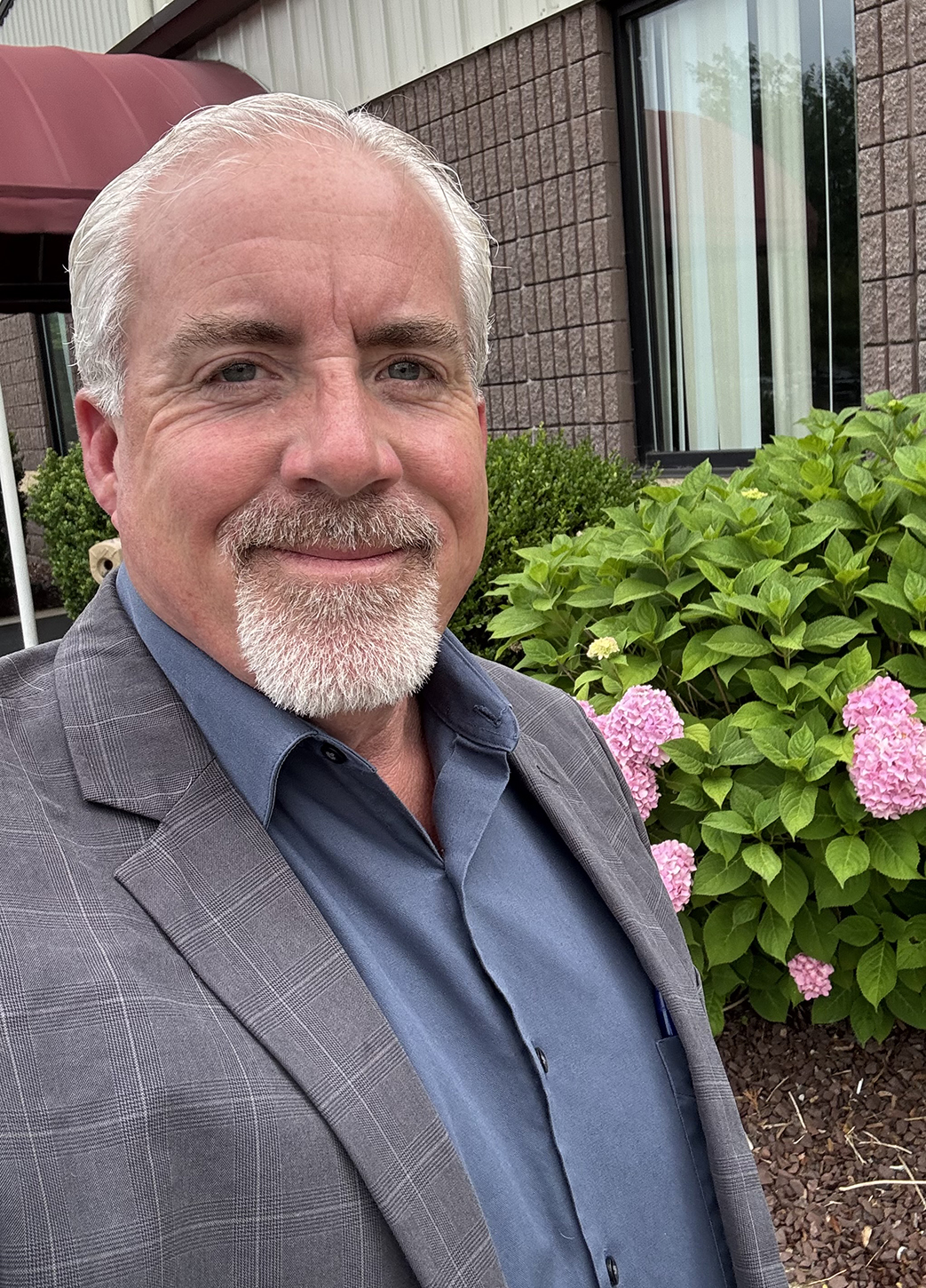 Mark Biddle, Chair
Mark Biddle, Chair
Mark Biddle is a certified Professional Wetland Scientist (PWS) with more than 30 years of experience. For most of his career, Mark worked at the Delaware Department of Natural Resources and Environmental Control (DNREC) in the Watershed Assessment and Management Section. Mark managed the Wetland Monitoring and Assessment Program, the Watershed Management Program, Stream Habitat and Biology Program, and the Submerged Aquatic Vegetation Program. Mark has been involved in Delaware’s regulatory and permitting responsibilities for tidal wetlands, subaqueous lands, 401 water quality certification, and drafting legislation and regulations for non-tidal wetlands. His work has involved the Delaware Wetlands Conservation Strategy, wetland restoration, compensatory mitigation, and wetland banking, assessing restored wetlands for nutrient assimilation, serving as team leader for Delaware Whole Basin Management, leading multiple statewide and regional wetland mapping and other geospatial efforts, and participating on various ecological and green infrastructure initiatives. Mark holds degrees in Natural Resource Management and Soil and Water Management attending both Delaware State University and the University of Delaware. Since leaving employment at DNREC, Mark is currently working for Maryland Environmental Service as Program Manager for Engineering and Geographic Information Systems (GIS).
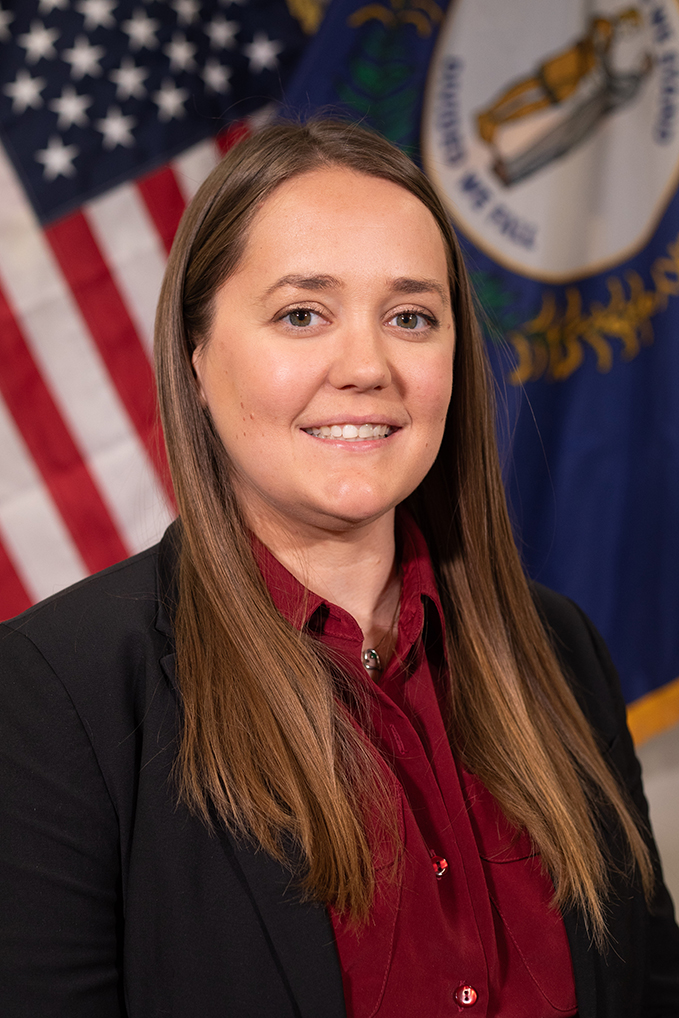 Samantha Vogeler, Vice Chair
Samantha Vogeler, Vice Chair
Samantha Vogeler has worked for the Kentucky Division of Water since 2015. With a strong regulatory background, she has extensive experience in implementing regulations under the Clean Water Act and the Safe Drinking Water Act. She is the Supervisor for the 401 Water Quality Certification Section, where she ensures statewide implementation and compliance with the 401 Water Quality Certification Program and serves on the Kentucky Interagency Review Team. Since 2019, Samantha has served on the National Association of Wetland Managers Board of Directors and is currently the Vice Chair. Outside of work, she enjoys spending time with her family, playing sports, traveling, and exploring the outdoors.
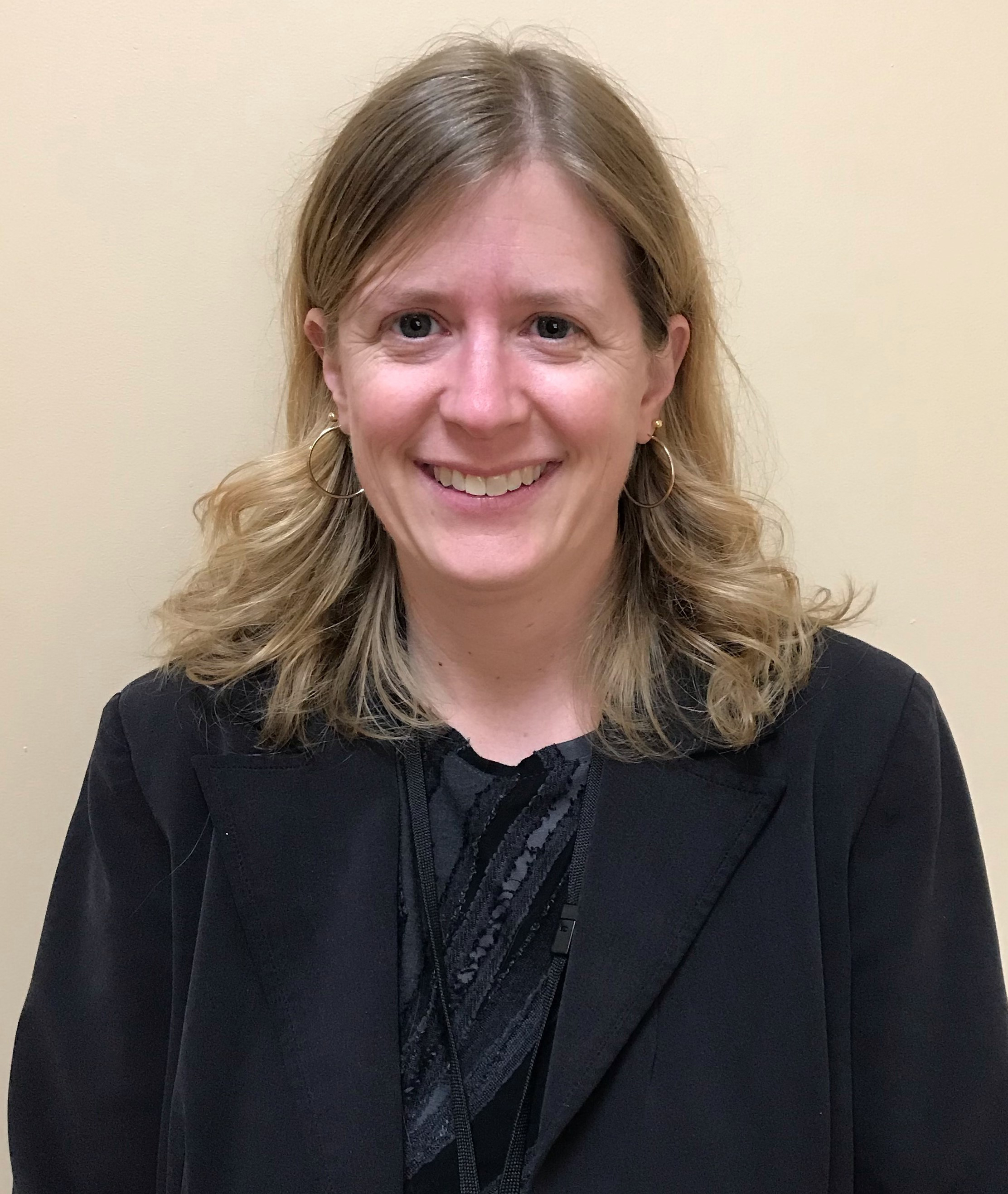 Amy Lounds, Secretary
Amy Lounds, Secretary
Amy Lounds has served as the Section Manager for the Michigan Department of Environment, Great Lakes, and Energy’s Field Operations Support Section in the Water Resources Division for the past five years. The Section is responsible for administering, supporting, and enforcing division programs such as the Wetlands, Lakes and Streams, Great Lakes, Floodplains, Critical Dunes, High Risk Erosion Areas, Dam Safety, and the Coastal Management programs, which includes Michigan’s assumed Section 404 of the federal Clean Water Act program. Her duties include managing program staff, ensuring compliance with federal requirements and state-federal agreements, providing program guidance for staff and the public, and resolving complex and controversial technical and policy issues. Amy has worked for EGLE for over 25 years and earlier in her career served as the Wetlands, Lakes and Streams Unit Supervisor and the statewide wetland policy specialist and the administrator of the wetland mitigation banking program. Prior to working for EGLE, Amy worked for the Michigan Department of Transportation doing environmental reviews and permit applications for wetlands, inland lakes and streams, and floodplains. Amy has a Bachelor of Science in Zoology from Michigan State University and a Maters in Landscape Architecture and Conservation Biology and Ecosystem Management from the University of Michigan. Amy currently lives in Holt, Michigan with her husband and two daughters, and enjoys spending time with her family and being outdoors.
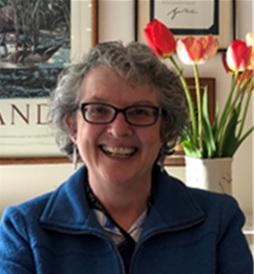 Lauren Driscoll, Treasurer
Lauren Driscoll, Treasurer
Lauren Driscoll is the Manager of the Wetlands Program at the Washington State Department of Ecology, a position that she has held since 2005. She is responsible for ensuring statewide consistency in the implementation of wetland permitting, technical assistance, and guidance for local wetland regulations. She oversees the wetland compliance program and writes grants for wetland program activities including projects to improve wetland mapping in Washington. Lauren specializes in wetland policy, mitigation options such as wetland banks, In Lieu Fee and advance mitigation, and analyzing federal legislative and executive actions related to wetlands. Lauren received her bachelor’s degree in environmental studies from the Evergreen State College where she studied ecology, botany, organic agriculture and computer sciences.
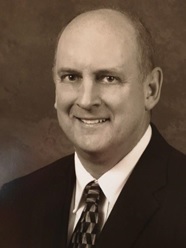 Collis Adams, Past Chair
Collis Adams, Past Chair
Collis has served on the Board of Directors of NAWM (ASWM) for many years including several terms as Chair. Collis recently retired as the administrator of the Wetlands Bureau at the New Hampshire Department of Environmental Services and is currently the owner/manager of Adams Environmental Consulting, LLC providing consulting services to property owners, engineers, municipalities, and others. During his tenure at DES he was responsible for all activities relative to the New Hampshire Dredge and Fill Law (NH RSA 482-A) and the Shoreland Water Quality Protection Act (NH RSA 483-B). Prior to filling that role, he spent ten years with the DES Alteration of Terrain Program reviewing and permitting stormwater management plans for large scale developments and 5 years with the DES Subsurface Systems Bureau reviewing plans for on-site wastewater disposal systems. As administrator of the wetlands bureau he was instrumental in the implementation of an in-lieu fee program for wetland mitigation and then expanding that program to include streams and their riparian habitats. Before DES, Collis spent six years in private engineering consulting and prior to that, a five-year stint with the New England Division of the Army Corps of Engineers. In 1980 Collis graduated with a BSCE degree in civil/environmental engineering from the University of Massachusetts. Collis lives in Goffstown, New Hampshire with his wife Laura. He has two children, one of each, and is particularly proud that he has instilled in them his same sense of love for the outdoors. Collis particularly enjoys spending time along the varied coastlines of New England. Collis also serves on his local Select Board, Planning Board, and Conservation Commission.
Members At Large
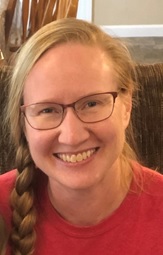 Stacia Bax - Missouri Department of Natural Resources
Stacia Bax - Missouri Department of Natural Resources
Stacia Bax is the Environmental Manager in the Financial Assistance Center within the Missouri Department of Natural Resources. Her section awards loans and grants to wastewater, stormwater, and nonpoint source projects across the State of Missouri. Stacia has over 23 years of experience with the department and has also worked most recently with the Section 401 Water Quality Certification Program for over 11 years, Section 402 NPDES program master general permits (industrial stormwater, industrial process water, construction/land disturbance stormwater, and municipal stormwater), and NPDES eReporting Rule. She also has worked with Section 319 Nonpoint Source grants, Water Quality Standards rulemaking, TMDL development, Montauk State Park as a seasonal naturalist, and fieldwork in the beautiful Ozarks of Southwest Missouri.
In her personal time, she enjoys spending time with her husband, daughter and son (and two dogs) hiking, camping, and kayaking as well as archery, scouting activities, and watching her daughter play college volleyball and son with shotgun sports. In her spare time, Stacia loves to read, cook and bake (pies are her favorite), explore new places, and craft fiber arts (knitting and crocheting namely, though she has a loom she would love to learn to weave on). She lives in Central Missouri.
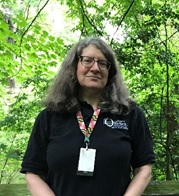 Denise Clearwater - Maryland Department of the Environment
Denise Clearwater - Maryland Department of the Environment
Denise Clearwater has worked in Maryland’s wetland programs since 1986. She has a background in developing and implementing programs in wetland regulation, wetland training, and mitigation, as well as managing special projects for grants and program improvement and assisting in policy development. She has represented the Wetlands and Waterways Program in the Maryland Department of the Environment on numerous interagency work groups for regulatory, wetland monitoring, restoration, preservation and stream health and is a past co-chair of the Chesapeake Bay Program Wetland Work Group. She is also a member of the Society of Wetland Scientists. Denise has a B.S. in zoology from the University of Maryland and an M.S. in wildlife management from Frostburg State College (now University).
 Andy Robertson, GeoSpatial Services at Saint Mary's University of Minnesota
Andy Robertson, GeoSpatial Services at Saint Mary's University of Minnesota
Andy Robertson is the Executive Director of GeoSpatial Services at Saint Mary’s University of Minnesota. In this role, he is responsible for oversight and management of all GeoSpatial Services projects, activities and staff. GeoSpatial Services is engaged in a wide variety of projects across the Lower 48 and Alaska including wetland inventory; National Hydrography Dataset updates; spatial data development; and, natural resource condition assessments. Andy has a diverse background in spatial information systems, watershed planning, wetland inventory, forest management, environmental impact assessment, desktop and server system support and database administration. He is a Registered Professional Forest Technologist (Alberta, Canada) and has experience leading natural resource projects for both private sector companies and public agencies across Canada and the United States including the Department of Interior, United States Army Corp of Engineers, NOAA, and the Department of Agriculture. Andy has a Forest Technology Diploma from Sault College of Applied Technology in Ontario, Canada, a B.Sc. in Environmental Science from the University of Waterloo and has completed postgraduate work in forest management at the University of Toronto. He is also a steering committee member for the Wetland Mapping Consortium and is co-chair of the Alaska GeoSpatial Council Wetland Technical Group.
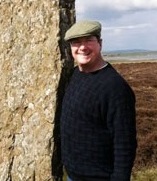 Bill Ryan - Oregon Department of State Lands
Bill Ryan - Oregon Department of State Lands
Bill Ryan is the Deputy Director at the Oregon Department of State Lands (DSL) leading the Aquatic Resources Management Program which is responsible for implementation of Oregon’s Removal-Fill and Wetlands Conservation Laws. Prior to joining the DSL in June of 2010, Bill enjoyed 14 years at the Oregon Department of Transportation performing environmental compliance work including wetlands delineation and mitigation, mitigation banking, regulatory streamlining and process improvement. Bill started his professional career in Southern California in 1989 providing environmental planning and habitat restoration expertise for various planning and engineering firms. Bill has been a member of NAWM (ASWM) for nine years. He also serves on the Board of the Oregon Public Management Association which provides networking and low-cost training opportunities for managers and aspiring managers in public service. Bill has an undergraduate degree in Geography Ecosystems Management from UCLA and a master’s in Biology from California State University, Fullerton. His master’s thesis topic was a study of succession in the alluvial scrub plant community following flood events in the Santa Ana River, California. In his spare time Bill enjoys hiking, camping, travel, skiing, singing acapella madrigals with the Sherwood Renaissance Singers and reading a good book.
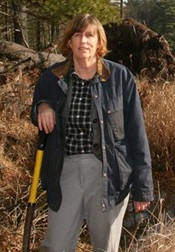 Mary Ann Tilton - New Hampshire Department of Environmental Services
Mary Ann Tilton - New Hampshire Department of Environmental Services
Mary Ann Tilton is the Assistant Wetlands Bureau Administrator with the State of New Hampshire, Department of Environmental Services (NHDES), Wetlands Bureau. Mary Ann oversees wetlands permitting and assists in overall wetlands bureau natural rescue management. She has been with NHDES for over 30 years in various management and supervisory positions. She helped develop the Wetlands Enforcement program and supervised wetlands compliance for 17 years. She has served as the Assistant Administrator since 2005 and oversees state wetlands rules development, program development, and wetlands permitting. She is the recipient of an EPA Merit Award (2019) for development of a Wetlands BMP, multi-year rules initiative, and development of stream crossing rules. She holds a BA degree in Botany and Zoology from Connecticut College, MS in Zoology from University of Rhode Island, and a JD from UNH Law School (formerly Franklin Pierce Law Center), and is a Professional Wetland Scientist (PWS) and member of the Society of Wetland Scientists. She lives with her family in Concord, NH and enjoys biking, hiking, skiing, and birding, and exploring amazing wetland habitats.
Symposia, Workshops, Training Sessions
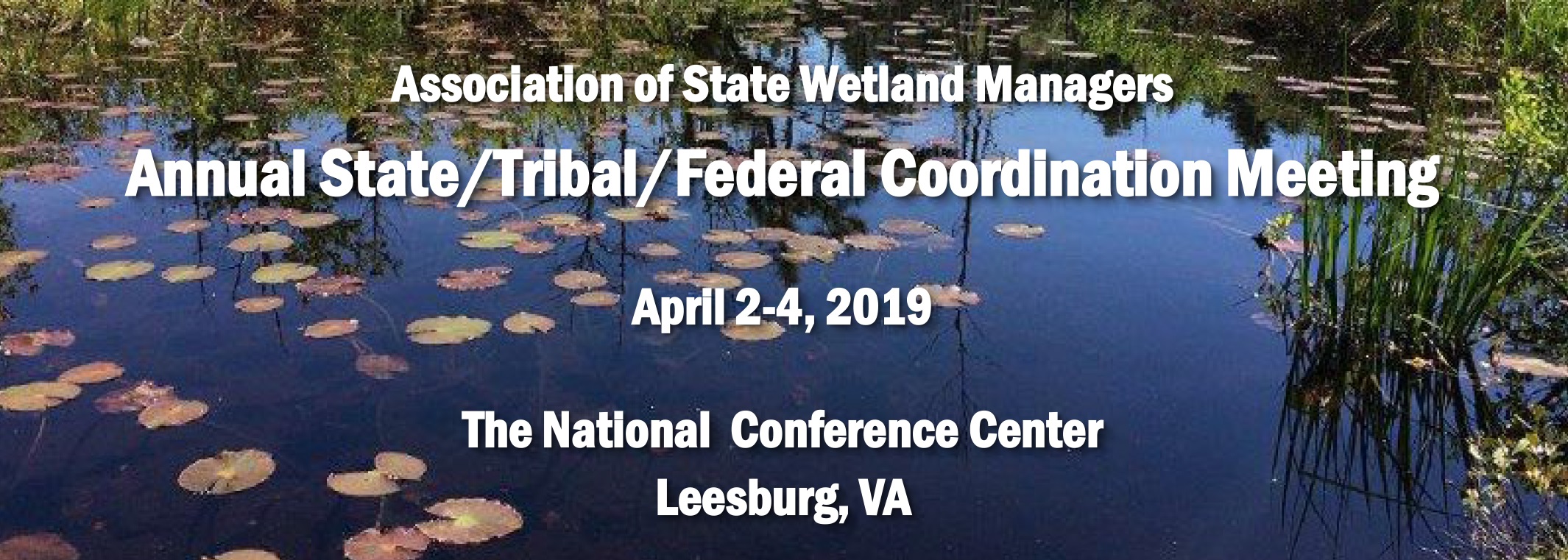
Annual State/Tribal/Federal Coordination Meeting
Translating Wetland Science into Fair and Reasonable Government Policies
April 2-4, 2019
NAWM's annual meeting was held at the The National Conference Center in Leesburg, VA
For information go here or please contact, Laura at laura@nawm.org
![]()
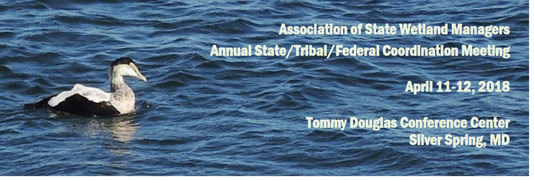
Annual State/Tribal/Federal Coordination Meeting
Federalism Re-envisioned: Exploring Possibilities for Enhanced
State and Tribal Roles in Water Resources Protection,
Conservation and Management
April 11-12, 2018
NAWM's annual meeting was held at the Tommy Douglas Conference Center in Silver Spring, MD
For information go here or please contact, Laura at laura@nawm.org
![]()
Annual State/Tribal/Federal Coordination Meeting
Using Sound Science and Effective Communication to Strengthen Wetland Conservation, Restoration and Management
April 11-13, 2017
NAWM's annual meeting was held at the National Conservation Training Center in Shepherdstown, West Virginia.
For information, please contact, Laura at laura@nawm.org
![]()

Annual State/Tribal/Federal Coordination Meeting
Managing Change - Wetland Protection and Restoration in an Era of Changing Water and Energy Demands
March 29-31, 2016
NAWM's annual meeting was held at the National Conservation Training Center in Shepherdstown, West Virginia.
For information, please contact, Laura at laura@nawm.org
![]()
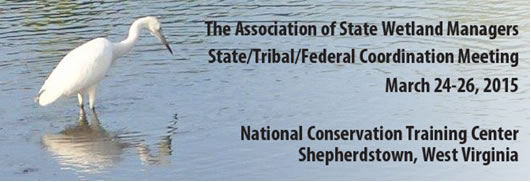
Annual State/Tribal/Federal Coordination Meeting
The New World of Wetlands: Dealing with Shifting
Landscapes, Laws and Climate
March 24-26, 2015
NAWM's annual meeting was held at the National Conservation Training Center in Shepherdstown, West Virginia.
For information, please contact, Laura at laura@nawm.org
![]()

Annual State/Tribal/Federal Coordination Meeting
Connectivity, Collaboration and the Application of Sound Science
March 4-6, 2014
NAWM's annual winter meeting was held at the National Conservation Training Center in Shepherdstown, West Virginia.
For information, please contact, Laura at laura@nawm.org
![]()

Annual State/Tribal/Federal Coordination Meeting
Conserving Wetlands and Waterways for Future Generations
March 19-21, 2013
NAWM's annual winter meeting was held at the National Conservation Training Center in Shepherdstown, West Virginia.
For information, please contact, Laura at laura@nawm.org
![]()

Annual State/Tribal/Federal Coordination Meeting
Sustaining the Nation's Commitment to No Net Loss of Wetlands Through Challenging Times
March 13-15, 2012
NAWM's annual winter meeting was held at the National Conservation Training Center in Shepherdstown, West Virginia.
For information, please contact, Laura at laura@nawm.org
![]()
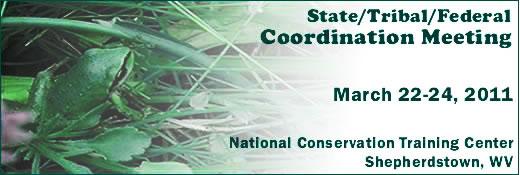
Annual State/Federal Coordination Meeting
Conservation, Regulation and Management of Headwater Wetlands
March 13-15, 2011
NAWM's annual winter meeting was held at the National Conservation Training Center in Shepherdstown, West Virginia.
For information, please contact, Laura at laura@nawm.org![]()
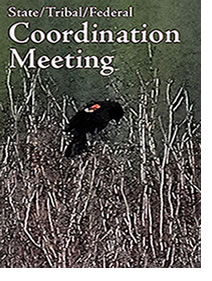
State/Tribal/Federal Coordination Meeting
Clean Water, Wetlands and the Law: New Tools and Opportunities
February 23-25, 2010
NAWM's annual winter meeting was held at the National Conservation Training Center in Shepherdstown, West Virginia.
For information, please contact, Laura at laura@nawm.org
![]()
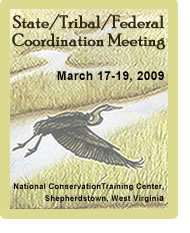
State/Tribal/Federal Coordination Meeting
Opportunities to Streamline and Integrate Section 404 with Other Clean Water Act Programs through State/Tribal Leadership
March 17-19, 2009
NAWM's annual winter meeting was held at the National Conservation Training Center in Shepherdstown, West Virginia.
For information, please contact, Laura at laura@nawm.org
![]()
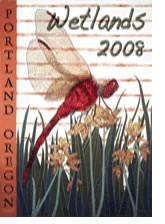
Wetlands and Global Climate Change
Agenda with PowerPoint Presentations
September 16-18, 2008; with field trips on September 15th and 18th
Workshops on September 19th
Doubletree Hotel, Portland, Oregon
Our Special Thanks to Speakers, Sponsors, Volunteers and Participants for a Successful Conference
On behalf of the National Association of Wetland Managers, the Pacific Northwest Chapter of the Society of Wetland Scientists, the Oregon Department of State Lands and all our sponsors and cooperating parties, I want to thank you for making Wetlands 2008; Wetlands and Climate Change a success. We’re still adding up the numbers but I’m guessing attendance was around 400. Many attendees approached me during the conference to tell me how much they enjoyed the conference and how much they had learned. Over and over people said that they have rarely attended a conference where ALL the presentations where of such high caliber. This is only possible because so many people contributed their time, knowledge and expertise.
![]()
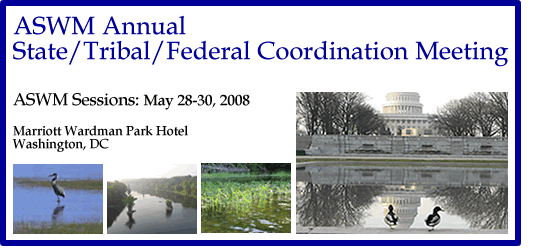
NAWM Joins the Society of Wetland Scientists to Hold its Annual State/Tribal/Federal Coordination Meeting
May 28-30, 2008
Wardman Park Hotel, Washington, DC
For information, please contact, Laura at laura@nawm.org
![]()

Wetlands 2007: Watershed-Wide Strategies to Maximize Wetland Ecological and Social Services: Conserving Wetlands to Reduce Natural Hazards; Improve Water Quality, Protect Critical Headwaters, Maintain Biodiversity, and Protect and Restore Coastal Resources
August 28-29, 2007; Field Trips/Workshops, August 27
Colonial Williamsburg Lodge and Conference Center
Williamsburg, Virginia
Agenda with PowerPoint Presentations
In recent years, scientific and engineering studies have documented the value of ecological and social services provided by headwater wetlands and streams. Protecting and restoring these areas is critical to sustaining the ecological and social services provided by broader aquatic resources including larger riverine and coastal systems. The loss of these critical resources results in threats to human health and safety, and higher costs for drinking water, storm water control, flood protection and recreation. However, federal, state and local programs have encountered numerous challenges in efforts to restore and maintain these critical resources. The purpose of this symposium was to identify opportunities and integrated strategies for protecting and restoring headwater wetlands, streams and related waters.
![]()
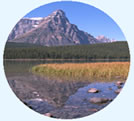
Strengthening the Roles of Local Governments, Land Trusts, and Watershed Councils in Protecting Vulnerable Wetlands and Aquatic Resources
June 2, 2007 Participate in the Swaner Nature Festival
June 4-5, 2007 Workshop, Treasure Mountain Inn
June 6, 2007 Field Trip
Treasure Mountain Inn, Park City, Utah
Agenda with PowerPoint Presentations
This workshop was tailored to address the challenges to protecting, managing and conserving wetlands in the West, particularly those wetlands and waters excluded from protection under the Clean Water Act. There are a number of unique issues that affect wetlands in the West such as low precipitation, water rights and high competition for all water resources. The workshop identified tools, programs, funding, and other resources that are available to local governments, land trusts and watershed councils. It highlighted case studies and provide special emphasis on the application of science in local approaches to wetlands conservation, protection and management,
![]()
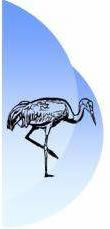
State/Tribal/Federal Coordination Workshop: The Clean Water Act: Applying Sound Science to Address Program Revisions, Court Challenges and Opportunities for Wetlands and Headwaters
March 27-29, 2007
NAWM's annual winter meeting was held at the National Conservation Training Center in Shepherdstown, West Virginia.
For information, please contact, Laura at laura@nawm.org
For a complete list of NAWM past meetings, click here.
NOTICE OF NON-DISCRIMINATION POLICY
The National Association of Wetland Managers (NAWM) does not discriminate on the basis of race, color, national origin, disability, age, or sex in administration of its programs or activities, whether carried out by NAWM directly, through a contractor, or any other entity with whom NAWM arranges to carry out its programs, services and activities. NAWM does not intimidate or retaliate against any individual or group because they have exercised their rights to participate in actions protected, or oppose action prohibited, by 40 C.F.R. Parts 5 and 7, or for the purpose of interfering with such rights.
NAWM collects and maintains demographic data on the race, color, national origin, sex, age, or disability status of the population it serves.
NAWM continually seeks effective ways to accommodate those with visual or hearing impairments. NAWM also takes reasonable steps to ensure that persons with Limited English Proficiency (LEP) will have meaningful access and an equal opportunity to participate in our services, activities, programs, and other benefits.
NAWM designated civil rights coordinator: Portia Osborne, Executive Director
The NAWM Executive Director is responsible for coordination of compliance efforts and receipt of inquiries concerning non-discrimination requirements implemented by 40 C.F.R. Parts 5 and 7 (Non-discrimination in Programs or Activities Receiving Federal Assistance from the Environmental Protection Agency), including Title VI of the Civil Rights Act of 1964, as amended; Section 504 of the Rehabilitation Act of 1973; the Age Discrimination Act of 1975; Title IX of the Education Amendments of 1972; and Section 13 of the Federal Water Pollution Control Act Amendments of 1972 (hereinafter referred to collectively as the federal non-discrimination laws).
If you have any questions about this notice or any of NAWM’s non-discrimination programs, policies, or procedures, you may contact:
Portia Osborne, Executive Director
500 Washington Street, Suite 201
Portland, ME 04103
207-892-3399 Ext 11
portia@nawm.org
If you believe that you have been discriminated against with respect to a NAWM’s program or activity, you may contact the Executive Director identified above or visit our website at nawm.org to learn how and where to file a complaint of discrimination.
ABOUT NAWM
NAWM publishes a bi-monthly membership newsletter "Wetland News," and weekly "Insider's Edition." Read more about NAWM's publications. Learn about membership benefits.
NAWM is governed by a board of directors and has a small staff. The National Association of Wetland Managers does not discriminate on the basis of race, color, national origin, sex, age or disability in its programs or activities.
Constitution of the National Association of Wetland Managers
Bylaws of the National Association of Wetland Managers
STRATEGIC PLANS
FOR MORE NAWM INFORMATION
- NAWM Staff Biographies
- NAWM Board of Directors
- Donate to NAWM
- Membership Information
- Doing Business With NAWM
- Volunteer - Many Ways to Volunteer
- NAWM Events
- Sponsorship Opportunities
- Contact Us
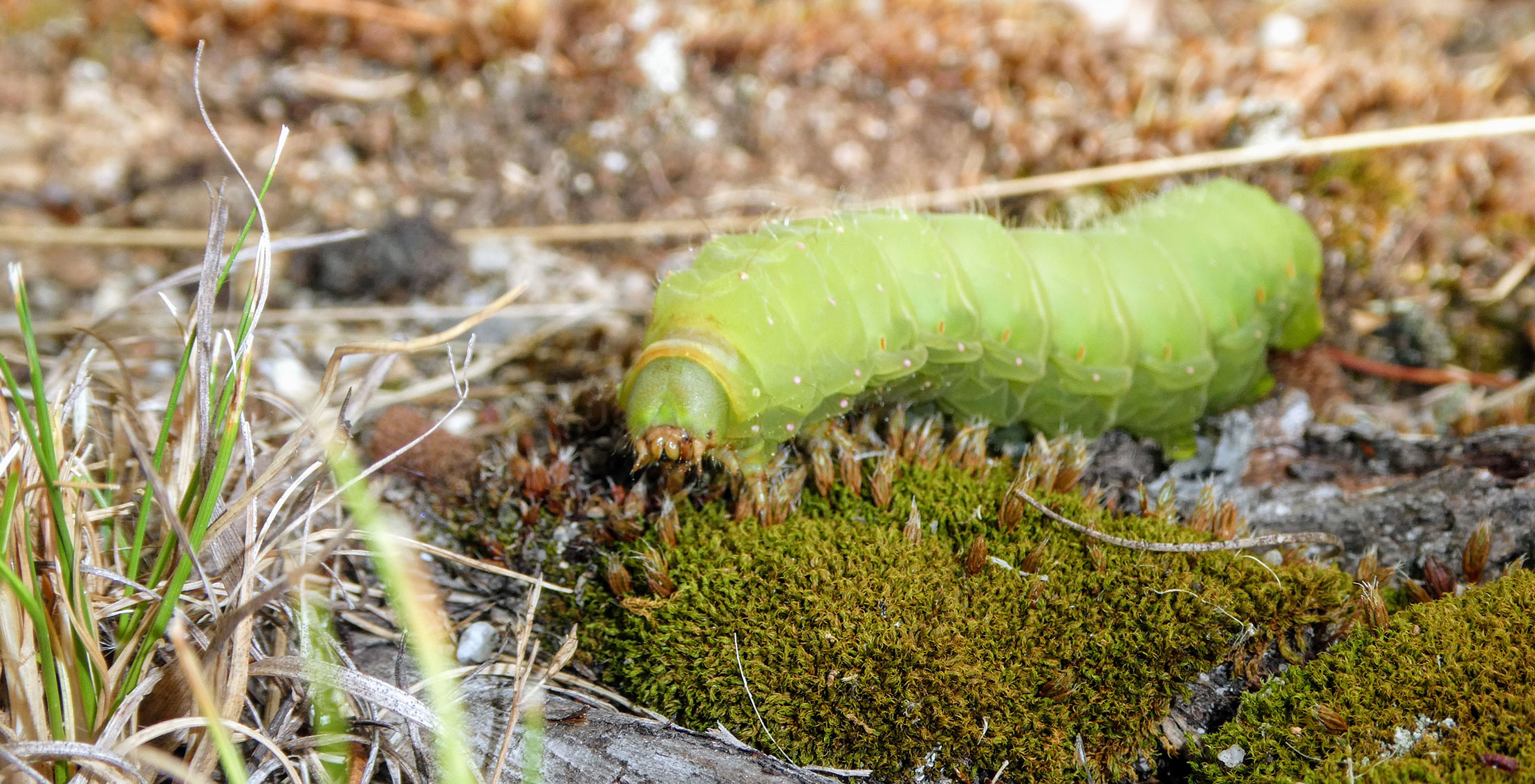
OUR GOALS
- Help states and Tribes develop and implement wetland regulatory and management programs
- Improve the coordination of wetland programs and policies at all levels of government
- Provide training and capacity building for state and Tribal wetland programs
- Facilitate the integration of wetlands into water resources and watershed management
- Build conservation and restoration partnerships among states, tribes, local governments, nonprofits, and other interested parties
- Translate wetland science into fair and reasonable government policies
- Encourage minority participation in wetland protection, restoration and management
- Integrate wetlands into broader landscape and resource management initiatives.
ANNUAL REPORTS
NON-DISCRIMINATION POLICY
The National Association of Wetland Managers does not discriminate in employment opportunities or practices because of race, color, religion, sex (including pregnancy, gender identity, and sexual orientation), national origin, age disability or any other status protected by law. Learn more about our Notice of Non-Discrimination Policy.
Sponsorship Opportunities
NAWM offers Sponsorship Opportunities for Wetland News, NAWM Members’ Webinar Series, and our Annual State/Tribal/Federal Coordination Meeting. Learn more about sponsorship opportunities.
Publications
 The Association conducts research and publishes reports, guidebooks, news articles, brochures, white papers, and summaries of findings of symposia and workshops. These are available electronically to all interested individuals and organizations.
The Association conducts research and publishes reports, guidebooks, news articles, brochures, white papers, and summaries of findings of symposia and workshops. These are available electronically to all interested individuals and organizations.
